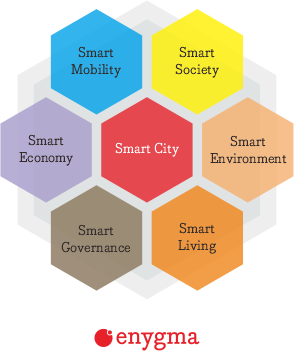Smart City: For What It’s Worth
Smart City
For the past ten years, a city becomes so outdated if no technologies implemented to provide a secure and desirable environment.
On the grounds of improving public services, the city leaders are becoming too sloppy when it comes to choosing the first step of delivering a smarter city, resulting in inefficient technology costs. At the end of the day, the solution was not so effective in making its community’s life better.
6 is the magic number
As you will find on any works of literature, fundamentally, the smart city consists of 6 main pillars:
- Smart Living
- Smart Mobility
- Smart Economy
- Smart Society/People
- Smart Environment
And that is all the information the city leaders would master to build a sophisticated city. The city will simply be crowned as a smarter city if they can shift all the paperwork to become a fancy technological-advanced data recording system.

That is why a typical smart city implementation is expensive because it doesn’t involve the intention of how to integrate all the pillars, or at least the idea to solve how all stakeholders will be able to work on collaborative workspaces.
No one to blame, because the term of Smart City itself is pretty much blurred. You will not find a single self-explanatory meaning of this term online. It is challenging to distill a precise definition of a smart city — Wiki Said.
However, we still need to agree with some explanations and define the nearest meaning of a smart city. In our opinion, a Smart City is a civilization area that uses multiple data collectors such as IoT Sensors, citizen information, and other instruments and then uses the insights to provide a secure and desirable environment.
It is like putting some eyes, noses, ears (to sense), and also functional hands (to control) to your city so you can speak to its language, interact and decide what responses to take for solving a particular problem.

That being said, any implementation of a smart city must consider the fact that integration is the key; ignoring this will create a defect to the solution and will escalate to become a time-bomb waiting for a significant explosion that responsible for the business process failure.
So, what will you need to make your city smarter? It should not be a rhetorical question, and the answer must be simply A Right Platform. Choosing the right platform to manage the operations across the city will ensure that all innovations will consider the ease of the integration, making officials interact directly with both community and city infrastructure and giving real-time responses.
View, Measure, and Improve
At Enygma, we believe that our Intelligent Operations Platform will empower city leaders to collaborate among multiple entities to provide a secure & desirable environment. By using its insights this will allow all members of the organization to be able to view, measure, and improve public services through collaborative workspaces and the integration of instruments & infrastructure.
The platform will allow stakeholders to add new data resources with only a few adjustments, combining the insights and eliminating the complexity to build a powerful notifications system. It standardized the communication protocols, making it the biggest yet faster smart city platform available.
In conclusion, a smart city is turning to be a vast ecosystem, and any city leaders will need a good roadmap, a full commitment, enough knowledge, and choosing the right intelligent operations platform to manage its operation across the city. A good platform will minimize the complexity, high learning curve, and failure rate.
(EK)
